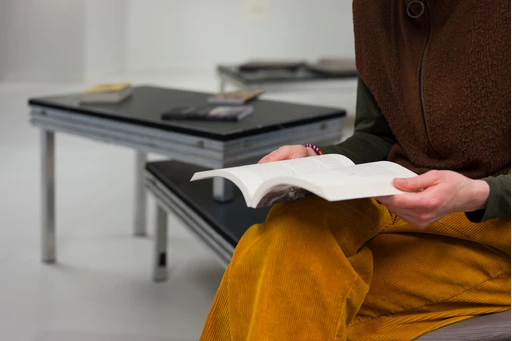
Usufructuaries of earth. Chapter three, convention
Friday 24 May 2024
Working sessions
11.30–16.00 hrs
1 “Beyond Value” convened by Denise Ferreira da Silva and Massimiliano (Mao) Mollona.
2 “Taking Debt Out of the Closet” convened by Verónica Gago and Lucí Cavallero.
3 “Germinating Resistance” convened by Samanta Arango Orozco and Arelly Collazos of Grupo Semillas.
4 “Failing, Dreaming, Doing: rehearsing abolition” convened by Molemo Moiloa and Nare Mokgotho and Yvonne Phyllis
A small number of participants can join the working sessions (maximum capacity of 12 people per session) through the following open call: Please send an email to opencall@bakonline.org by midnight 14 May 2024, wherein you introduce yourself, indicate which working session you would like to join and and a short written motivation of no more than 200 words.
What is the value of labor of those subjects who are not self-possessed? What is the value of those debts which are never extinguished? The working session engages these questions with reference to the colonial and neocolonial history of Brazil—and, specifically, the process of land occupation by racial capital through the figures of forced labor and unpayable debts—and in the historical forms of the plantation, the “modern” industry, and the financialization of poverty and dispossession. Thinking with feminist Black philosopher Beatriz Nascimento’s reflections on the quilombo as a form of cultural and material resistance, “Beyond Value” imagines a more-than-human relatedness in excess of value generated by radical refusals of labor, possession, and indebtedness within the fields of art and political economy.
Moreover, in bringing together artists and researchers working in and with different forms of visual culture, “Beyond Value” reflects on visual and “(un)aesthetic” strategies that critically reflect on value, that is, through non-bourgeois categories of political economy.
Recommended reading:
– Denise Ferreira da Silva, Unpayable Debt, 2021
– Massimiliano Mollona, “Cyclopes at Work: Capital as Technology” (chapter 3) from Brazilian Steel Town: Machines, Land, Money and Commoning in the Making of the Working Class, 2019.*
This working session is held in English.
Confirmed participants include: Asia Bazdyrieva (art historian, Berlin), Lama El Khatib (researcher and cultural worker, Berlin), Stefano Harney (writer and educator, Brasilia and Cologne), Ola Hassanain (artist, Amsterdam and Khartoum), Dina Mohamed (researcher and convener BAK Fellowship for Situated Practice, BAK, Utrecht), Philip Rizk (writer and filmmaker, Berlin).
__________________________________________________________________________________
Working session is held in Spanish and English with live interpretation Spanish–English.
Confirmed participants include: Clara Balaguer (cultural worker and curriculum builder, co-convener Community Portal, BAK, Utrecht), Iliada Charalambous (artist, Rotterdam), Philippa Driest (artist, Rotterdam), Patricia Enriquez (researcher and activist, Pinay sa Holanda, Rotterdam), Carmen José (illustrator, activist, and educator, member of Feministas en Rotterdam), Khadija Tahiri-Hyati (president for cleaners as part of the FNV, Federation of Trade Union), Rotterdam).
Recommended reading: Verónica Gago and Lucí Cavallero’s A Feminist Reading of Debt (2021).*
__________________________________________________________________________________
Working group is held in Spanish and English with live interpretation.
Confirmed participants include: Joud Al-Tamimi (artist and curator, Berlin), Luigi Coppola (Scuola di Agricultura, Brussels and Castiglione d’Otranto), Grace Lostia and Berend Zoheetik (basic activist kitchen, Utrecht), Nida Sinnokrot (architect and co-founder Sakiya, Ramallah), Lena Wilderbach and Elif Kaya (Jineolojî activists and members of Jinwar).
Recommended reading: “Micro-Resistances: An Interview with Samanta Arango Orozco,” Prospections “Usufructuaries of earth.”*
__________________________________________________________________________________
The South African Freedom Charter (1950) proclaimed that “the land shall be shared among those who work it!” It envisioned a system supported by state structures “to save the soil and assist the tillers.” However, despite the new democratic dispensation in 1994 and the introduction of new land redistribution laws, the reality of near-total land dispossession persists in South Africa today. In the face of these failed dreams, and in the context of ongoing battles for and through land in places such as Palestine, where many continue to dream of and plan for return, “Failing, Dreaming, Doing” is nestled as part of the ongoing phases and practices of return—cycles of the practice of abolition.
Working session is held in English.
Confirmed participants include: Brenna Bhandar (critical legal theorist and scholar, Vancouver), Aya Bseiso (architect and curator, Amman), Layal Ftouni (researcher and educator, Utrecht), Tareq Khalaf (design educator, filmmaker, and cultural activist, Ramallah), and Shela Sheikh (researcher and educator, Paris)
Recommended reading/viewing:
Yvonne Phyllis, “Cecil John Rhodes’ vision is alive on white-owned farms in South Africa,” Daily Maverick, 27 March 2023.
The Nyarha Farm Workers Documentary, The Forge, 2023
*All recommended reading/listening/viewing material will be shared with working session participants in advance of the convention.
__________________________________________________________________________________